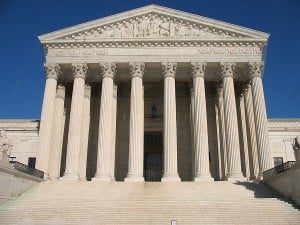News today from Cincinnati, where the Sixth Circuit Court of Appeals has upheld natural marriage laws in Michigan, Ohio, Kentucky and Tennessee.
Circuit Judge Jeffrey Sutton wrote in his opinion:
“Of all the ways to resolve this question, one option is not available: a poll of the three judges of this panel, or for that matter all federal judges, about whether gay marriage is a good idea. Our judicial commissions did not come with such a sweeping grant of authority, one that would allow just three of us—just two of us in truth—to make such a vital policy call for the thirty-two million citizens who live within the four states of the Sixth Circuit.”
Today’s ruling runs counter to other recent decisions by the 4th, 7th, 9th and 10th Circuits. This conflict between circuit courts means that the Supreme Court will now weigh in on the legality of gay marriage. The Supreme Court had, in the lalndmark 2013 case of U.S. vs. Windsor, struck down the Defense Of Marriage Act; but in October, the Court had declined to hear any of the appeals in gay marriage cases, since there was no disagreement among appeals courts.
Judge Sutton, a strict Constitutionalist, wrote,
“The right to marry in general, and the right to gay marriage in particular, nowhere appear in the Constitution. That route for recognizing a fundamental right to same-sex marriage does not exist.”
Further explaining his view, Judge Sutton wrote:
The theory of the living constitution rests on the premise that every generation has the right to govern itself. If that premise prevents judges from insisting on principles that society has moved past, so too should it prevent judges from anticipating principles that society has yet to embrace. It follows that States must enjoy some latitude in matters of timing, for reasonable people can disagree about just when public norms have evolved enough to require a democratic response. Today’s case captures the point. Not long ago American society took for granted the rough correlation between marriage and creation of new life, a vision under which limiting marriage to opposite-sex couples seemed natural. Not long from now, if current trends continue, American society may define marriage in terms of affirming mutual love, a vision under which the failure to add loving gay couples seems unfair. Today’s society has begun to move past the first picture of marriage, but it has not yet developed a consensus on the second. If, before a new consensus has emerged on a social issue, federal judges may decide when the time is ripe to recognize a new constitutional right, surely the people should receive some deference in deciding when the time is ripe to move from one picture of marriage to another. So far, not a single United States Supreme Court Justice in American history has written an opinion maintaining that the traditional definition of marriage violates the Fourteenth Amendment.
Judge Sutton continued,
“A dose of humility makes us hesitant to condemn as unconstitutionally irrational a view of marriage shared not long ago by every society in the world, shared by most, or not all, or our ancestors, and shared still today by a significant number of states.”
The full decision is available here.
Mat Staver, founder and chairman of the Liberty Counsel which filed an amicus brief on behalf of the American Family Association of Michigan, one of the coauthors of the Michigan marriage amendment, said in a press release:
The Supreme Court has upheld marriage as a foundational social institution that is necessarily defined as the union of one man and one woman:
- Marriage is “fundamental to the very existence and survival of the race.” Skinner v. Oklahoma, 316 U.S. 535, 541 (1942).
- “An institution in the maintenance of which in its purity the public is deeply interested, for it is the foundation of the family and of society, without which there would be neither civilization nor progress.” Maynard v. Hill, 125 U. S. 190 (1888).
“Marriage is not merely a creation of any one civilization or its statutes, but is an institution older than the Constitution and, indeed, older than any laws of any nation. Marriage is a natural bond that society or religion can only ‘solemnize.’”











